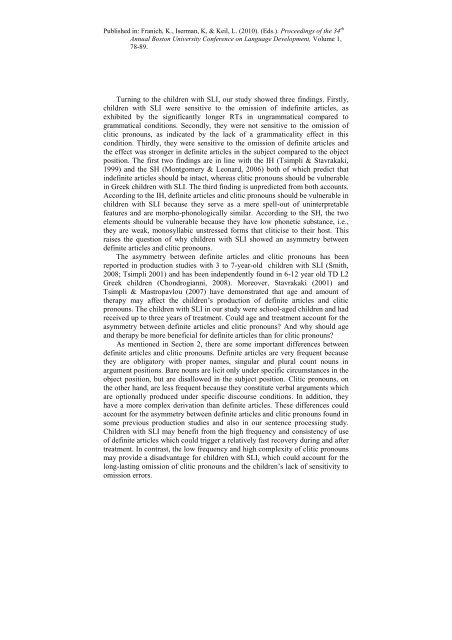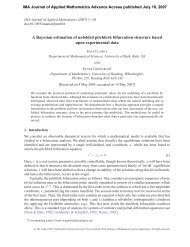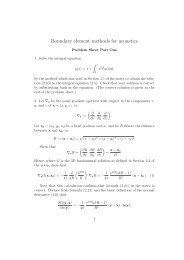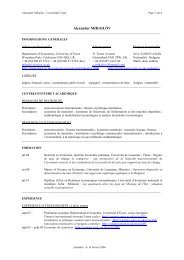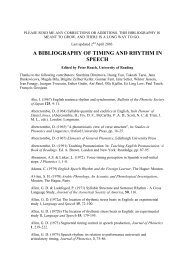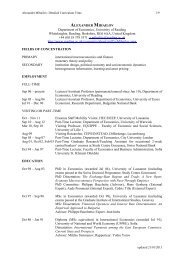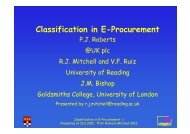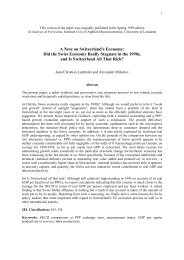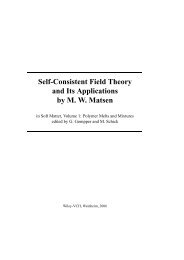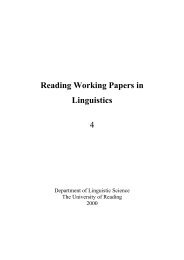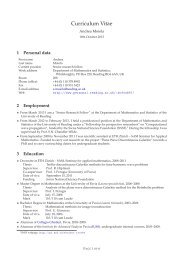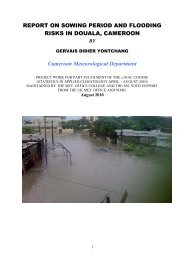On-line Processing of Articles and Clitic Pronouns by Greek ...
On-line Processing of Articles and Clitic Pronouns by Greek ...
On-line Processing of Articles and Clitic Pronouns by Greek ...
You also want an ePaper? Increase the reach of your titles
YUMPU automatically turns print PDFs into web optimized ePapers that Google loves.
Published in: Franich, K., Iserman, K, & Keil, L. (2010). (Eds.). Proceedings <strong>of</strong> the 34 th<br />
Annual Boston University Conference on Language Development, Volume 1,<br />
78-89.<br />
Turning to the children with SLI, our study showed three findings. Firstly,<br />
children with SLI were sensitive to the omission <strong>of</strong> indefinite articles, as<br />
exhibited <strong>by</strong> the significantly longer RTs in ungrammatical compared to<br />
grammatical conditions. Secondly, they were not sensitive to the omission <strong>of</strong><br />
clitic pronouns, as indicated <strong>by</strong> the lack <strong>of</strong> a grammaticality effect in this<br />
condition. Thirdly, they were sensitive to the omission <strong>of</strong> definite articles <strong>and</strong><br />
the effect was stronger in definite articles in the subject compared to the object<br />
position. The first two findings are in <strong>line</strong> with the IH (Tsimpli & Stavrakaki,<br />
1999) <strong>and</strong> the SH (Montgomery & Leonard, 2006) both <strong>of</strong> which predict that<br />
indefinite articles should be intact, whereas clitic pronouns should be vulnerable<br />
in <strong>Greek</strong> children with SLI. The third finding is unpredicted from both accounts.<br />
According to the IH, definite articles <strong>and</strong> clitic pronouns should be vulnerable in<br />
children with SLI because they serve as a mere spell-out <strong>of</strong> uninterpretable<br />
features <strong>and</strong> are morpho-phonologically similar. According to the SH, the two<br />
elements should be vulnerable because they have low phonetic substance, i.e.,<br />
they are weak, monosyllabic unstressed forms that cliticise to their host. This<br />
raises the question <strong>of</strong> why children with SLI showed an asymmetry between<br />
definite articles <strong>and</strong> clitic pronouns.<br />
The asymmetry between definite articles <strong>and</strong> clitic pronouns has been<br />
reported in production studies with 3 to 7-year-old children with SLI (Smith,<br />
2008; Tsimpli 2001) <strong>and</strong> has been independently found in 6-12 year old TD L2<br />
<strong>Greek</strong> children (Chondrogianni, 2008). Moreover, Stavrakaki (2001) <strong>and</strong><br />
Tsimpli & Mastropavlou (2007) have demonstrated that age <strong>and</strong> amount <strong>of</strong><br />
therapy may affect the children’s production <strong>of</strong> definite articles <strong>and</strong> clitic<br />
pronouns. The children with SLI in our study were school-aged children <strong>and</strong> had<br />
received up to three years <strong>of</strong> treatment. Could age <strong>and</strong> treatment account for the<br />
asymmetry between definite articles <strong>and</strong> clitic pronouns? And why should age<br />
<strong>and</strong> therapy be more beneficial for definite articles than for clitic pronouns?<br />
As mentioned in Section 2, there are some important differences between<br />
definite articles <strong>and</strong> clitic pronouns. Definite articles are very frequent because<br />
they are obligatory with proper names, singular <strong>and</strong> plural count nouns in<br />
argument positions. Bare nouns are licit only under specific circumstances in the<br />
object position, but are disallowed in the subject position. <strong>Clitic</strong> pronouns, on<br />
the other h<strong>and</strong>, are less frequent because they constitute verbal arguments which<br />
are optionally produced under specific discourse conditions. In addition, they<br />
have a more complex derivation than definite articles. These differences could<br />
account for the asymmetry between definite articles <strong>and</strong> clitic pronouns found in<br />
some previous production studies <strong>and</strong> also in our sentence processing study.<br />
Children with SLI may benefit from the high frequency <strong>and</strong> consistency <strong>of</strong> use<br />
<strong>of</strong> definite articles which could trigger a relatively fast recovery during <strong>and</strong> after<br />
treatment. In contrast, the low frequency <strong>and</strong> high complexity <strong>of</strong> clitic pronouns<br />
may provide a disadvantage for children with SLI, which could account for the<br />
long-lasting omission <strong>of</strong> clitic pronouns <strong>and</strong> the children’s lack <strong>of</strong> sensitivity to<br />
omission errors.


